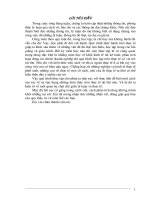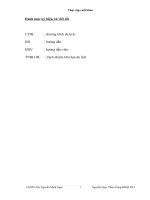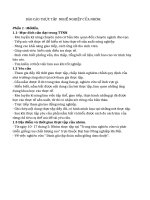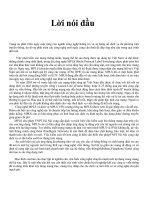Assignment on translation - Báo cáo thực tập dịch ehou Đại học mở hà nội, chủ Đề economy 2
Bạn đang xem bản rút gọn của tài liệu. Xem và tải ngay bản đầy đủ của tài liệu tại đây (260.52 KB, 64 trang )
<span class="text_page_counter">Trang 1</span><div class="page_container" data-page="1">
ĐỊA ĐIỂM HỌC: Trường Cao đẳngCôngThươngViệt Nam
HÀ NỘI 2022
</div><span class="text_page_counter">Trang 2</span><div class="page_container" data-page="2"><b><small>Title: </small>CURRENT NEWS (SOCIETY (LANGUAGE, POLITICS))</b>
My declaration is that this assignment is written all by myself under strictmonitering from my supervisor.
Ha Noi, 6<small>th</small>March, 2022
<i>SignatureSignature</i>
</div><span class="text_page_counter">Trang 3</span><div class="page_container" data-page="3"><b>TABLE OF CONTENTS</b>
<b>Part A: IntroductionPart B: Development</b>
<b>Chapter 1: The translated texts</b>
<i><b>I. The translated texts of the two articles (From English into Vietnamese)</b></i>
<b> 1. Article 1:Jerome Powell: The US central bank’s boss has indicated that he plans to press ahead with interest rate increases this month.</b>
1.1 Translated text1.2 Analysis
1.2.1 Contextual analysis1.2.2 Grammatical Cohesion1.2.3 Lexical cohesion
<b>2. Article 2: Cost of living: Warning UK faces biggest income squeeze in nearly 50 years</b>
2.1 Translated text2.2 Analysis
2.2.1 Contextual analysis2.2.2 Grammatical Cohesion2.2.3 Lexical cohesion
<i><b>II.The translated texts of the two articles (From Vietnamese into English)</b></i>
<b>1. Article 3: Thịtrườngnộiđịa: HàngViệtphảichinhphụcngườiViệt</b>
1.1 Translated text
<b>2. Article 4: Đắtđỏvàrủiro</b>
2.1 Translated text
<b>Chapter 2: Comment on translations</b>
<b>I. Text 1:Jerome Powell: The US central bank’s boss has indicated that he plans topress ahead with interest rate increases this month</b>
1. Comments
2. Difficulties in translation
</div><span class="text_page_counter">Trang 4</span><div class="page_container" data-page="4"><b>II. Text 2: Cost of living: Warning UK faces biggest income squeeze in nearly 50years</b>
</div><span class="text_page_counter">Trang 5</span><div class="page_container" data-page="5"><i><b>PART A: INTRODUCTION</b></i>
Economic growth is what every economy tries to achieve for the good of everyone as awhole. Developing, producing more, increased wages, higher levels of education,better and better technologies is what we strive for. But doing all that, does that meanthat we are living a better life? Or is it just the ideal of doing better, not really theresult that keeps us following the dream of a perfect world. The effects of economicgrowth are full of positives points such as boost in infrastructures, urban development,higher education, globalisation, creates employment, higher wages for workers, betterliving standards for the population, and the list can go on and on. But aren’t there anyexternalities to all of this? There are some of the negative externalities of growingabove what the economy can take, reaching the limits where growing is counter-productive.
Competition plays a significant and regular role in balancing the chain of supply anddemand. Economists assert that there are different sellers and buyers in the marketplace for each service and this difference paves the way for competition that allowsprices to change as a response to change in demand and supply. Competition is acrucial need for invisible hands to maintain a balance in economy. There is an exampleof primitive society with two products, i.e. deer and beaver to explain hisunderstanding. In current scenario, it can be asserted that competition is a healthyapproach to some extent, taking into account that it has both advantages andadversities.In a simplified form, classical economists define competition as a rivalrous,equilibrating and an endless process. In this competitive process, the actual prices ofthe goods are attracted to natural prices, taking into account that the overall rate ofprofit displaces towards normal analogues. It strengthens the free mobility of capitals.It is significant to note that Classical economic analysis highlights and adheres to erectcompetition, taking into amount Amit’s trifling example: where an ever-presentpressure to cut the costs per unit will increase productivity by keeping intoconsideration the division of labor. Furthermore, Classical approach towards economyasserts advantageous employment where an individual is given prime importance
</div><span class="text_page_counter">Trang 6</span><div class="page_container" data-page="6">rather than society. This advantage is derived from natural association rather thannecessity.
<b>PART B: DEVELOPMENT</b>
<b>CHAPTER 1: THE TRANSLATED TEXTS</b>
<b>I. The translated texts of the two articles (From English intoVietnamese)</b>
<i><b>1. Article 1:Jerome Powell:The US central bank’s boss has indicated that</b></i>
<i><b>he plans to press ahead with interest rate increases this month.</b></i>
Congress, Jerome Powell said he's in favourof a 0.25 point increase, aimed at tackling the surging cost of living.The bank
chobiếtôngủnghộmứctănglãisuất0,25 điểmphầntrăm, nhằmgiảiquyết chiphísinhhoạtđangtăngcao.
thừanhậnrằngơngsẵnsàngtiếptụctănglãisuấtxuốngthấphơnnữanếulạmphát,vốnđolườngmứcđộtăngnhanhcủa chi phísinhhoạttheothờigian, vẫn"caoliêntục."
Ý tưởngtănglãisuấtlàđểkiểmsốtmứctănggiáhiệntạivàdựđốn.
Vídụ, lãisuấtcaohơnlàmchoviệcđivayđắthơn. Đốivớicáchộgiađình,điềuđócóthểcónghĩalà chi phíthếchấpcaohơn, mặcdù - đốivớiđạiđa số
</div><span class="text_page_counter">Trang 7</span><div class="page_container" data-page="7">is under pressure to rein ininflation as prices in the USrise at the fastest rate in 40years.Analysts expect a rate hike in
March, which would bethe first since 2018.It comes as costs for food, fuel and cars haverisen sharply in recent months, leaving
Ơngnói: “Lạmphátmàchúng ta đangtrải qua chẳngkhácgìnhữnggìchúng tađãtrải qua trongnhiềuthậpkỷ.
Khi bắtđầuđạidịch, CụcDựtrữLiên bang đãgiảmlãisuấtxuống 0
Nhưngmộtloạtcácvấnđề, chẳnghạnnhưnhucầucaonhưhạnchếdễdàng,thiếulaođộngvàcácvấnđềchuỗicungứngđãdẫnđếnviệctănggiávốnhànghóanóiriêng.
kếtgiảithíchnhữnggìcácnhàhoạchđịnhchínhsáchđanglàmvàtạivìnhữnggìđãxảyratrongcuộckhủnghoảngtàichínhnăm 2008.
đãđiệnbáorõràngnhữnggìơngmuốnlàmtạicuộchọptiếptheocủangânhàngtrungươngtronghaituần: đềxuấttănglãisuất0,25điểmphầntrăm, đồngthời dichuyểncẩnthậnvàtheodõicáctácđộngkinhtếcủachiếntranh ở Ukraine.
đãphảiđốimặtvớimộtcơngviệckhókhănkhicốgắngkiềmchếlạmpháttăngvọt.
</div><span class="text_page_counter">Trang 8</span><div class="page_container" data-page="8">families' budgets strained.Mr Powell admitted that he was opento furtherinterest rate increasesfurther down theline if inflation,which measureshow quickly the cost of living rises over time, remains "persistently high."The idea of raising
Mộtloạtcácđợttănglãisuấtđãđượcdựkiến trongnăm nay.
Cuộcxâmlượccókhảnănglàmsuyyếutăngtrưởngtồncầuđồngthờiđẩygiácảlên, đặcbiệtlànănglượngvàthựcphẩm.
chorằngcáchtiếpcậnthậntrọnglàtốtnhấtvàđặttấtcảcácqnbàicủamìnhlênbàn.
</div><span class="text_page_counter">Trang 9</span><div class="page_container" data-page="9">interest rates is to keep those current and predictedprice rises under control.Higher interest rates make borrowing more expensive, for example.For households, that could mean higher mortgagecosts, although - for the vast
</div><span class="text_page_counter">Trang 10</span><div class="page_container" data-page="10">majority of homeowners - theimpact isnot immediate, and some will escape it entirely.Many central banks, includingthe Federal Reserve in the US, aim to keep inflation contained at 2%.Mr Powell acknowledged that priceincreases
</div><span class="text_page_counter">Trang 11</span><div class="page_container" data-page="11">have jumped far abovethat target. InJanuary, the increase in the cost of living jumped by 7.5% when compared with a year earlier."The inflation that we're experiencing is just nothing like anything we've experienced in
</div><span class="text_page_counter">Trang 12</span><div class="page_container" data-page="12">decades," he said.At the start of the pandemic, the Federal Reserve slashed rates to zero in a bid to stimulatespendingand the economyat a time when many sectors were shut-down.But a mix of issues, such as high demand
</div><span class="text_page_counter">Trang 13</span><div class="page_container" data-page="13">as restrictions ease, labour shortagesand supply chain problemshave led to
increasesin the cost of goods in particular.
The chairmanof
America's central bank Jerome Powell has madeit a point during his tenure oftrying to
</div><span class="text_page_counter">Trang 14</span><div class="page_container" data-page="14">demystify what the Federal Reserve does. He is
committed to explaining what policymakers are doing and why because of what happened during the 2008 financial crisis.Even by those standards, he was unusually blunt during his semi-
</div><span class="text_page_counter">Trang 15</span><div class="page_container" data-page="15">annual Congressional testimony.
Mr Powell telegraphing explicitlywhat he wants to do at the central bank's next meeting in two weeks: proposing a quarter percentage point rate increase, while moving carefully and
</div><span class="text_page_counter">Trang 16</span><div class="page_container" data-page="16">watchingthe economic
implications of war in Ukraine.Even before Russia's invasion,the Fed had a tough jobon its hands trying to tame soaring inflation.A series of rate hikes were already expected this year.But the conflict
</div><span class="text_page_counter">Trang 17</span><div class="page_container" data-page="17">in Ukraine has complicated that job. The invasion is likely to undermine globalgrowth while pushing up prices, especially for energy and food.Given the uncertainty, Mr Powell istaking the view that a cautious approachis best
</div><span class="text_page_counter">Trang 18</span><div class="page_container" data-page="18">and is putting all his cards on the table.
<i><b>1.2.2 Grammatical Cohesion* Reference </b></i>
<i><b>For households, that could mean higher mortgage costs, although - for the</b></i>
vast majority of homeowners - the impact is not immediate, and some willescape it entirely”
<i><b>In this sentence, that refers to higher interest rates</b></i>
<i><b>E.g.2: “The chairman of America's central bank Jerome Powell has made it</b></i>
a point during his tenure of trying to demystify what the Federal Reserve
<i><b>does. He is committed to explaining what policymakers are doing and why</b></i>
because of what happened during the 2008 financial crisis.”
</div><span class="text_page_counter">Trang 19</span><div class="page_container" data-page="19"><i><b>In this sentence, he refers to the chairman of America's central bank Jerome</b></i>
<i><b>E.g.3: “Analysts expect a rate hike in March, which would be the first since</b></i>
<i><b>2018. It comes as costs for food, fuel and cars have risen sharply in recent</b></i>
months, leaving families' budgets strained.”
<i><b>In this case, itrefers to a rate hike</b></i>
<i><b>* Substitutions</b></i>
<i><b>E.g. 1: “In January, the increase in the cost of living jumped by 7.5% when</b></i>
<i><b>compared with one a year earlier.”</b></i>
<i><b>In this case, onereplace for “the increase in the cost of living”</b></i>
<i><b>* Conjunctions:</b></i>
Many conjunctions are used in text as the following examples:
<i><b>E.g.1: but in “But the conflict in Ukraine has complicated that job”</b></i>
<i><b>ease, labour shortages and supply chain problems have led to increases in the</b></i>
cost of goods in particular”
<i><b>Eg.3: because, andin “He is committed to explaining what policymakers are</b></i>
<i><b>doing and why because of what happened during the 2008 financial crisis”</b></i>
<i><b>1.2.3 Lexical cohesion* Repetition:</b></i>
<b>E.g.1: the cost of living (3) E.g.2:inflation (3)</b>
<b>E.g.3: price rises (2)E.g.3: interest rates (3)</b>
<b>E.g.1: surging = increase = rise = soarE.g.2: cost = price</b>
<i>The words: inflation, interest rates, central bank, cost of goods, price,</i>
<i>financial crisis…are repeated many times to emphasize topic: economy</i>
</div><span class="text_page_counter">Trang 20</span><div class="page_container" data-page="20"><i><b>2.Article 2: Cost of living: Warning UK faces biggest income squeeze in </b></i>
<i><b>nearly 50 years</b></i>
<b>2.1 Translatedtext</b>
<i><b>Cost of living: Warning UK faces biggest income squeeze in nearly 50years.</b></i>
<i><b>Chi phísinhhoạt: CảnhbáoVươngquốc Anh </b></i>
<i><b>đốimặtvớimứcthunhậplớnnhấttronggần 50 năm qua</b></i>
War in Ukraine will push up energyprices andsee UK families squeezed even further, a think tankhas warned.The Resolution
Foundation
forecasts that a typical household's income
Chiếntranh ở Ukraine sẽđẩygiánănglượnglêncaovàchứngkiến cácgiađình ởVươngquốc Anh bịsiếtchặthơnnữa, mộttổchứcnghiêncứuđãcảnhbáo.
TổchứcNghịquyếtdựbáorằngthunhậpcủamộthộgiađìnhđiểnhìnhsẽgiảmkhoảng 1.000 bảng Anh trongnăm nay khitácđộngcủalạmphátđượctínhđến.Đósẽlàmứcgiảmthunhậptheođiềukiệnthựctếlớnnhấtkểtừgiữanhữngnăm1970, nónóithêm.
Nhưngtrongmộtbáocáomới, TổchứcNghịquyếtchobiếtxungđột Ukraine
"Sựphụchồikinhtếsau Covid củaVươngquốc Anh đangdiễnratốtđẹp,
đồngthờicảnhbáorằngtiềnlươngcũngkhôngđượcdựbáosẽtăngnhanh.
</div><span class="text_page_counter">Trang 21</span><div class="page_container" data-page="21">will fall by about £1,000 this year once the effect of inflation is
That would be the biggest real-termsfall in incomes since the mid-1970s, it added.A
government
spokesperson said itrecognised the pressures household
giádầuvàkhíđốttồncầutăngđộtbiếntừnămngốibắtđầuảnhhưởngđếnhóađơnnănglượngcủachúngtơivàgiớihạngiánănglượngtăngvọt. Bạnnêncómột tinnhắntừnhàcungcấpcủabạnbâygiờgiảithíchnhữnggìđangxảyravớihóađơncụthểcủabạnvàcảnhbáovềviệctăngkhoảnghinợtrựctiếpcủabạn.
Điềuđósẽđủkhóđốivớinhiềuhộgiađình, nhưngchúngtôihiệnđangchứngkiến mứcgiákỷlụctạicáctrạmxăngdầu do chiếntranh ở Ukraine.TổchứcNghịquyếtcũngcảnhbáorằngcuộcxungđộtsẽkhiếngiácảtăngthêm,vớilạmphátđạtđỉnhcùngthờiđiểmkhigiớihạngiátănglên.
hầuhếtcáckhoảntrợcấptrongđộtuổilaođộngvàlươnghưucủanhànướcsẽtăng3,1% vàotháng 4 - thờiđiểmmàmứctăng chi phísinhhoạtcóthểlêntới 8%.
Torsten Bell, giámđốcđiềuhànhcủaQuỹNghịquyết, chobiết:"Mặcdùảnhhưởngkinhtếtừchiếntranhsẽchothấykhôngđángkể sovớinhữngđaukhổmàhàngtriệungười Ukraine phảitrải qua,nhưngnóvẫnsẽcótácđộngđángkể ở Anh."
Ơngchorằnggiáxăngvàdầutăngcaosẽlàmtrầmtrọngthêm "cuộckhủnghoảngchi phísinhhoạt", gâyra "sựsiếtchặtđángkểđốivớithunhậpcủacácgiađình".Ngườiphátngơncủachínhphủchobiết:
"Chúngtơinhậnranhữngáplựcmàmọingườiđangphảiđốimặtvới chiphísinhhoạt, đólàlý do tạisaochúngtơiđangcungcấphỗtrợtrịgiákhoảng 20tỷbảng Anh trongnămtàichínhnàyvàtiếptheolàđểgiúpđỡ."
</div><span class="text_page_counter">Trang 22</span><div class="page_container" data-page="22">s are facing.Many families were already expectingtheir monthly spend to go up when the energy price cap jumps in April, andNational Insurancecontributions rise.But in a new report, theResolution
Foundation said the Ukraine conflict would
Họchobiếtđiềunày bao gồmthuếnhiênliệuđóngbăngđểgiảm chi phí,cũngnhưkhởiđộngchươngtrìnhgiảmgiáhóađơnnănglượng.
Họnóithêm: “Chúngtơicũngđãtăngmứclươngtốithiểulênhơn 1.000bảngmộtnămchongườilaođộngtồnthờigianvàQuỹhỗtrợhộgiađìnhtrịgiá500
triệubảngcủachúngtơiđanggiúpđỡnhữngngườidễbịtổnthươngnhấtvớicácchi phíthiếtyếu”.
</div><span class="text_page_counter">Trang 23</span><div class="page_container" data-page="23">push up living costs even further as the prices of fuel and other goods surged.It expects inflation, which measures how the cost of living changes over time,to peak inApril at 8.3%. That is much higher theBank of England's forecast of 7.25% back in
</div><span class="text_page_counter">Trang 24</span><div class="page_container" data-page="24">February."The crisis in Ukraine has increased both the scale of price risesbut also the degree of uncertainty about their levels andduration,"the Foundation's report said."The UK's post-Covid economicrecovery is well under
</div><span class="text_page_counter">Trang 25</span><div class="page_container" data-page="25">way, but a deep living standards downturn is just getting going," it added, also warning that wages arenot forecast to grow particularly fast either.At the start of April, spikes in global oil and gas prices from last year start to feed through
</div><span class="text_page_counter">Trang 26</span><div class="page_container" data-page="26">to our energy bills and the energy price cap jumps up.You should have had a messagefrom yourprovider by now explaining what's happening to your particular bill and warning about an increase to your direct debit.That will be hard enough for many household
</div><span class="text_page_counter">Trang 27</span><div class="page_container" data-page="27">s, but we're alsonow seeing record prices at petrol stations due to thewar in Ukraine. The Resolution
Foundation is also warning the conflict will bringmore price rises, withinflation peaking at the same point as the price cap goes up.
</div><span class="text_page_counter">Trang 28</span><div class="page_container" data-page="28">Its principal economist, Adam Cortlett, said soaring bills would hit low and middle-income families the hardest.He also suggestedpoorer households would face a "living standards rollercoaster" because of the way that benefit payments
</div><span class="text_page_counter">Trang 29</span><div class="page_container" data-page="29">are set months inadvance.For example, most working age benefits and the state pension are due torise by 3.1% in April - a time when the increase in the costof living could be as high as8%. But high inflation in 2022 should lead to bigger payments
</div><span class="text_page_counter">Trang 30</span><div class="page_container" data-page="30">next year.Torsten Bell, chief executive of the Resolution
Foundation, said: "While the economicfallout from the war will feel trivial comparedto the suffering experienced by millions of
Ukrainians, it will still have a
significan
</div><span class="text_page_counter">Trang 31</span><div class="page_container" data-page="31">t impact in Britain."He suggestedthat surging gas and oil prices would worsen the "cost of living crisis", causing a "painful squeeze on family incomes".A
government
spokesperson said: "We recognise the
pressures people are facing
</div><span class="text_page_counter">Trang 32</span><div class="page_container" data-page="32">with the cost of living, which is why we'reprovidingsupport worth around £20bn this financial year and next to help."They saidthis includes freezing fuel duties to keep costs down, as well as launchingenergy bills rebate program
</div>





